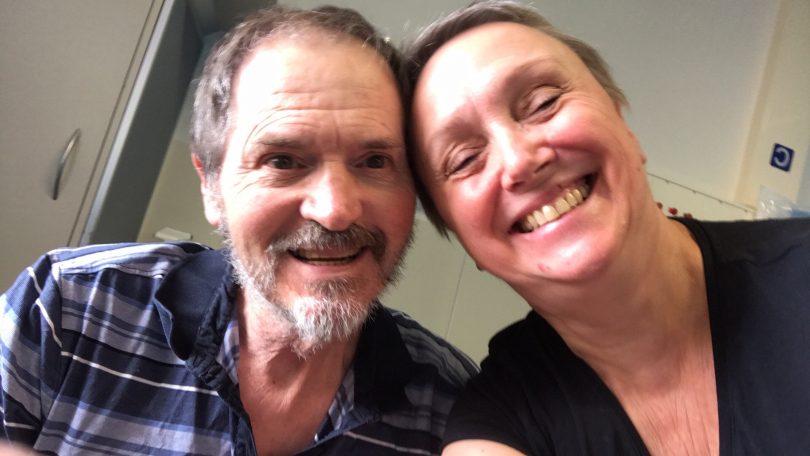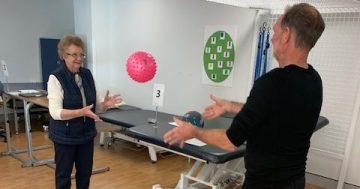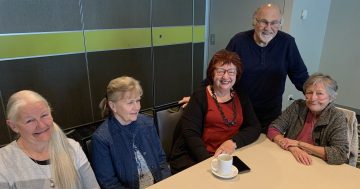
Steve Anderson is cared for by his wife Lorraine who has retired from her job as a nurse. Photo: Lorraine Anderson.
The physical and mental challenges faced by people living with dementia, and their carers, are being compounded by COVID-19 restrictions.
A former gym owner and fitness fanatic, Steve Anderson once spent his days cycling, rowing and dining out with his wife Lorraine and their friends in Canberra.
The 69-year-old grandfather of 11, with another on the way, now spends his time locked in his Forde home listening to music, doing jigsaw puzzles and petting his rescue greyhound, Cindy.
Steve can’t go out for coffee and, because of the lockdown, his mates are not permitted to visit for dinner or just spend quality time with him.
Steve was diagnosed with Parkinson’s Disease in 2014. About two years ago, he developed dementia.
Lorraine retired from her job as a nurse last year to care for her husband full-time after he had a number of falls and reached a point where she couldn’t leave him home alone.
“It really hit home when Steve put a bowl of Weet-Bix in the microwave with no milk or water, and I realised, OK, I need to be here – it’s not safe to leave him,” she said.
While Lorraine says they have received tremendous support from organisations such as Mable, the COVID lockdowns have hit both of them really hard – socially and emotionally.
Steve is not physically able to ride his bike, row or hit the gym but, up until the lockdown, he has enjoyed being able to go out for dinner with his friends, enjoy coffee in a cafe or have family visit.
Coronavirus has put an end to all of that.
“He really misses going to the club to play Keno and that social interaction,” Lorraine said.
“COVID has been devastating for him. He definitely has more down days now.”
Visits from social support workers have been cut back as well, with only personal carers considered ‘essential workers’, which is also taking its toll on Lorraine who struggles to find time for herself.
“When they come to shower Steve once a day, I can get out and take the dog for a walk,” she said.
“Before the lockdowns, when the support workers came and spent time with him, I could go shopping or, when his good friend came to visit, I would go out for lunch with my friends.
“Now we can’t do any of that and it’s devastating.”
Steve and Lorraine use their computer to keep in touch with the six children they have between them, and Steve’s 91-year-old mum who lives in Cairns.
“The iPad has been amazing,” Lorraine said, “Steve feels more connected with the family, and he can look things up and watch sports.”
Lorraine says she makes an effort to find time for herself so she can maintain the energy to care for her husband 24/7.
“I’m usually OK, but I have my days,” she said.
“I’m very, very aware of the need to take time out when the carers are here, so it doesn’t get on top of me.”
September is Dementia Awareness Month and, according to Dementia Australia, the number of people living with dementia is set to double in the next 25 years.
The condition impacts close to half a million Australians, and almost 1.6 million Australians are involved in their care.
People living with dementia can live active and fulfilling lives many years after diagnosis; however, they often experience discrimination.
In a recent Dementia Australia survey, more than 70 per cent of people believed discrimination towards people with dementia is common or very common.
Steve said when he is treated like a child or ignored in conversation, he feels angry and upset.
“People sometimes treat Steve like he’s stupid when he not – even some doctors,” Lorraine said.
Mable co-founder and CEO Peter Scutt says social distancing, mask wearing and other necessary measures can also cause stress and anxiety and confusion.
“It is challenging for all of us but there is certainly a big added impact on the physical, social and mental wellbeing of people living with dementia and those who are caring for them,” he said.
“I think we need to be especially aware of the potential for negative mental health outcomes for this more vulnerable group. “


















